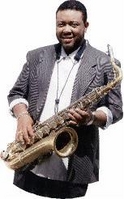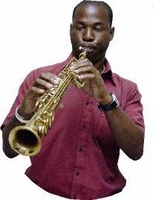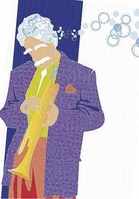

Tony Greene (left) and Tafane Bucksaecab (right).
Jamaica has a sterling history of horns in its music, the trumpet, trombone and saxophone giving songs a sparkle onstage and in the studio, and people such as Tommy McCook, Don Drummond, Wilton Gaynair, Lester Sterling, Sonny Bradshaw, Nambo Robinson, Dean Fraser and Tony Greene among those who have played their way into popularity.
There is, however, a distinct deficiency of horn players coming to public attention, though not of the people playing them.
Mickey Hanson, who plays a range of wind instruments and is probably best known as a trumpeter, reminds The Sunday Gleaner that the trumpet is the heralding instrument, calling the throng to witness a wedding or wage war alike.
However, distinctive hornlines have not been heralding the arrival of new players in Jamaican music for some time. Not that there isn't any new talent, but the opportunities to lay down lines in the studio and on the bandstand that will blow the world away are very limited.
As saxophonist Tony Greene, who played with Lloyd Parkes and We The People band for 16 years and released his sixth album, Midnight Blue, last September, put it, "Through the music change, we have less hornsman coming in now. Them not getting a chance. If them walk into a studio and record a song it not going to get any airplay."
Greene pointed out that Jamaican music, from mento through to ska and rocksteady, features the horns and "hornsmen still coming into the business from Alpha and Camp (the Military Band)". He went through both organisations. "Mostly me and Dean (Fraser) getting the recording sessions," Greene said, adding that many times working on some projects is done for free.
When there was a benefit show for saxophonist Egbert 'Eggy' Evans at The Deck, Trafalgar Road, New Kingston, in late May, there was a rousing finale with a number of horn players delivering Skatalites material, this after Hanson and Fraser had done solo stints. Many of them were from the
younger generation of hornsmen (Greene points out that he came into the business at 17 years old and is now 52).
And then there is Sonny Bradshaw's arrangement of the National Anthem, which featured trumpeters Dwight Richards, Vivian Scott, Everton 'Sting' Wray and Hopeton Williams. Fraser, Everton Gayle, Tafawee 'Tafane' Buchsaecab and Nicholas Larock played saxophone, while Barry Bailey, Nambo Robinson, Everton Pessoa and Romeo Grey delivered the trombones.

yet to start playing
Hanson hopes to add to the generation that is yet to even really start playing as, along with another Calabar High old boy who is a musician, he has recently started a music programme at the Red Hills Road school. Thirty-three students turned out for the first invitation, about four persons interested in playing the horns.
Interestingly, the programme recently received a donation of three wind instruments from Canada.
The proportion of students interested in playing the wind instruments to those who want to take on instruments like the drums and guitars in the rhythm section is on par with what Hanson has observed over the years. "Proportionate to other instrumentalists, horn players are the fewest," Hanson said, mentioning the National Volunteers as an organisation which, in addition to Alpha and the Military Band, also produced some horn players.
In addition, he has seen many persons start out playing the horns and, some time after, switch to an instrument in the rhythm section.
marching bands
He points to another source for horn players, particularly trumpeters. "What we have in Jamaica are a lot of marching bands," Hanson said. However, "I am yet to see anybody graduate from them."
Hanson says not only are rhythm instruments more available, but also in high schools there is generally no programme for learning the horns, mentioning one school in Montego Bay as a possible exception.
Added to that, Hanson has found some of the old instructions still being used, this as time has passed and there are recent developments relevant to instructing instrumentalists. Plus, he has not seen a horn programme at the Edna Manley College of the Visual and Performing Arts School of Music for some time.
He points out that horn players have suffered badly from the development of synthesisers, as the keyboards are able to approximate the sound. Still, Hanson says, "In the music business there are a lot of horn players. We do not have as many soloists as accompanists (who play in bands). Recently, there has been the emergence of one or two people who I see trying to push out as soloists, but not enough."
Trumpeter Dwight Richards fuses his horn and his voice in performance to very good effect, engaging audiences with good musicianship and humour.
Saxophonist Tafawee (much more widely known as Tafane) Buchsaecab is one of those newer generation horn players pushing out front and centre. The Alpha past student counts Unit Three, along with Carron McGibbon and Craige Henry, and stints with the Alphasonics, Jimmy Cliff and Rootz Underground among his performing credits.
lead and accompanist
Buchsaecab does both lead and accompanist duties, more of the former than the latter these days. And he realises that he has an advantage because of the instrument he plays. "We the saxophonists are fortunate. People love sax," he says.
Frankie Campbell of Fab Five says, "Sax is really the most popular wind instrument now, not because of Dean Fraser alone, although he helped to make it popular. The trombone hardly counts as a solo instrument. There is some flute. The oboe? Forget it."
"Because of the soprano saxophone, that has given me an outlet to play more solo gigs," Buchsaecab told The Sunday Gleaner. He sometimes performs with trumpeter Everton 'Sting' Wray as a horn section.
He is preparing to do his own recording in December going into January and says, "I would hope by April I would have even a single out, something you can identify as Tafane. I have done things for so many people," he said, adding that he has to give back something to music also.
Buchsaecab says he sees younger horn players than himself coming into music, noting "there is not much outlet for them". Still, he welcomes them as the music business is "big enough for everybody to get a piece".